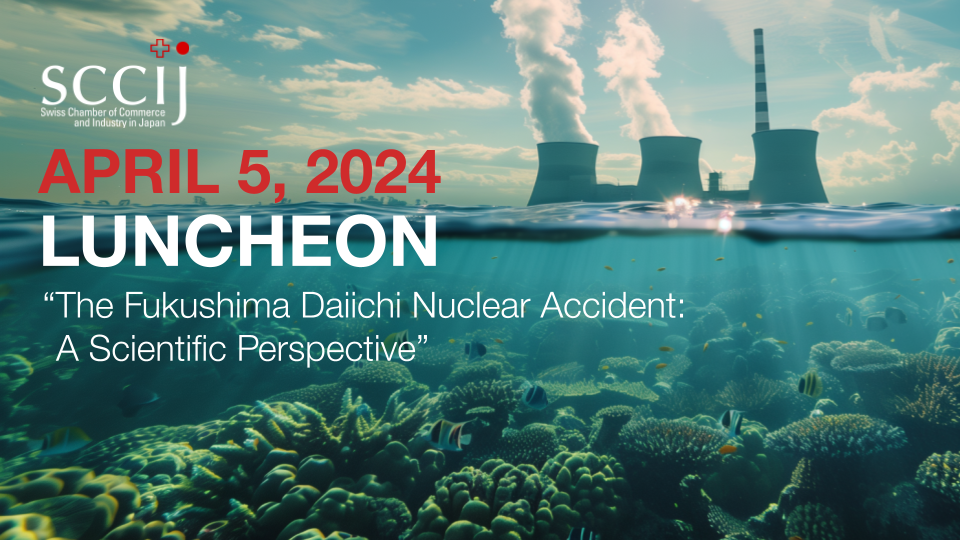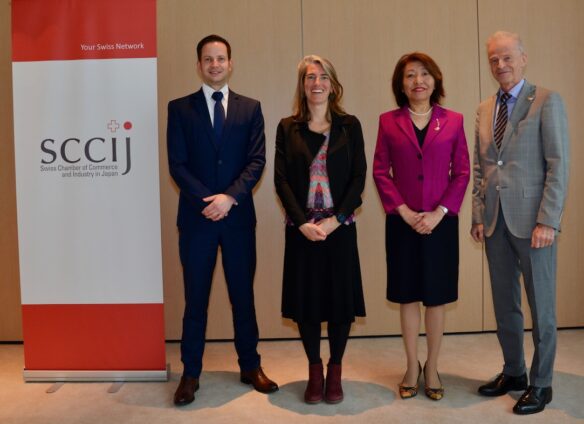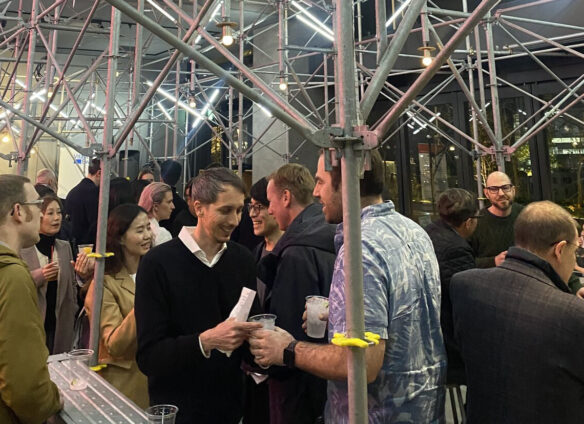+ Thank you to those who attended the luncheon!
Have a look at our article to find out what was discussed!
We are pleased to invite you to our April 2024 Luncheon with Prof. Dr. Núria Casacuberta Arola (Assistant Professor of Physical and Tracer Oceanography, ETHZ), who will deliver a speech titled “The Fukushima Daiichi Nuclear Accident: A Scientific Perspective”.

In March 2011, Japan faced a major nuclear disaster after the Tohoku earthquake and tsunami struck the Fukushima Nuclear Power Plant (FNPP). Since then, water has been continuously pumped through the plant’s ruins to cool the reactors, resulting in over 1.3 million tons of contaminated radioactive water stored in tanks on-site. Despite concerns raised by the scientific community, plans to release this wastewater were endorsed in July 2022. The Swiss Team, in collaboration with US and Japanese colleagues, aim to conduct an in-depth independent study on the ongoing release of radionuclides from FNPP into the Pacific Ocean. It seeks to understand their behavior in different marine environments, quantify their accumulation, and assess the potential radiation risk to marine life. Major concerns lay on tritium (3H), which cannot be removed by existing purification equipment, but other hazardous isotopes like 14C, 60Co, 106Ru, 137Cs, 90Sr, and 129I may also be present in tanks.
In her talk for the SCCIJ, Prof. Dr. Núria Casacuberta Arola, Assistant Professor of Physical and Tracer Oceanography at ETH Zurich, will explain the work that the Swiss Team is currently conducting in Fukushima and present some of the preliminary results obtained so far.
| Date & Time: |
Friday, April 5, 2024 |
|---|---|
| Venue: |
The Tokyo EDITION, Toranomon (MAP) |
| Entry Fee: |
|
| Registration: |
*Registration closed* |
| Concept: |
|
| Disclaimer: |
|
| Inquiries: |
By e-mail to info@sccij.jp |
Biography of the Speaker:
Originally from Barcelona, Spain, Prof. Dr. Núria Casacuberta Arola pursued her Bachelor’s studies in Environmental Sciences at the Autonomous University of Barcelona, where she also completed her Master’s and PhD. Shortly after defending her PhD thesis in February 2011, the Fukushima Nuclear Disaster struck Japan. This catastrophic event presented a unique opportunity for her to join an international team of scientists, spearheaded by Dr. Ken Buesseler (WHOI). Together, they investigated the extensive radioactive releases into the Pacific Ocean, marking the start of an exciting scientific journey. This experience ignited Prof. Dr. Casacuberta Arola’s passion for oceanic exploration and the application of radioactive tracers to unravel the mysteries of our oceans. In 2013, she was honored to receive an ETH postdoctoral fellowship, and in 2015 another one from the Swiss National Science Foundation, which allowed her to continue her scientific pursuits in Zürich. Today, her research endeavor focuses on utilizing long-lived radionuclides to decipher ocean circulation patterns and monitor changes in the Arctic and North Atlantic oceans—a science that is supported by the Swiss National Science Foundation, the European Research Council, and internal funding from ETH Zürich.
Speaker Prof. Dr. Casacuberta Arola working with an Accelerator Mass Spectrometers, the machine used to measure some of the radionuclides in Fukushima Daiichi.




![[𝗠𝗘𝗠𝗕𝗘𝗥𝗦 𝗢𝗡𝗟𝗬] Artificial Intelligence Summit: “Reshaping the Future Across Industries”](https://www.sccij.jp/wp-content/uploads/b172e83c-joint-ai-summit-thumbnail-584x424.jpg)




























